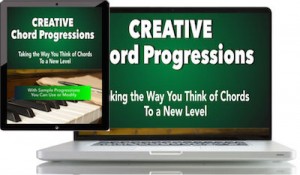 There’s no better way to improve your own songwriting than to discover the secrets of the world’s biggest hits. Get “The Essential Secrets of Songwriting” 10-eBook Bundle, which includes “From Amateur to Ace: Writing Songs Like a Pro,” as well as a FREE copy of “Creative Chord Progressions.” Read more..
There’s no better way to improve your own songwriting than to discover the secrets of the world’s biggest hits. Get “The Essential Secrets of Songwriting” 10-eBook Bundle, which includes “From Amateur to Ace: Writing Songs Like a Pro,” as well as a FREE copy of “Creative Chord Progressions.” Read more..
________________
 Some decisions, such as how to choose the key for a song, are not specifically songwriting issues. As you likely know, any performer will adjust the key to suit the singer’s range and abilities. So it’s likely that you’ll initially write your songs in whatever key suits your own voice.
Some decisions, such as how to choose the key for a song, are not specifically songwriting issues. As you likely know, any performer will adjust the key to suit the singer’s range and abilities. So it’s likely that you’ll initially write your songs in whatever key suits your own voice.
It’s also likely that since you’ll use your favourite instrument as a compositional tool, that you’ll write songs in keys that are easy for you to play. You’re probably not going to choose a key that you find difficult. It’s been said that famous song composer Irving Berlin initially wrote all his songs in F# major, because that was the key he found easiest to play on piano.
And before going further in this discussion, it’s important to note that some (or perhaps many) songwriters work out their songs without being aware of key at all. If you’ve found three or four chords that work nicely together, and you’ve created a melody and lyric that partner well with them, getting a song to work doesn’t necessarily require knowing the key.
But for many reasons, knowing the key can be a help to you during the songwriting process. Knowing the key, for example, will allow you to more easily find interesting chord substitutions, or create interesting modulations (key changes). So if the first step of identifying key is a mystery to you, read this article before continuing with this one.
So now that you’ve got a good idea of what key you chose when you composed your latest song, it’s time to determine if that is, in fact, the best key for you (assuming that you’re the one singing it). Here are some thoughts on that matter to consider:
- Vocal energy. Generally speaking, the higher the human voice is pitched, the more intense it becomes. So songs that are emotional (whether that emotion is love, pride, determination, etc.) will often benefit from placing the song higher in the singer’s range.
- Don’t assume that a song should be centred in the middle of a singer’s range. It’s tempting to suppose that placing a song in the middle of a singer’s tessitura (basic range) is logical, but there is something to be said for requiring a singer to have to “strain” (I use the word cautiously) a bit to reach those high notes. That need for pushing the range to the upper extremes is often determined by the song’s subject matter and lyrics.
- Experiment. You may feel that placing a song in a higher key will generate a good screamy kind of energy, but you may be missing out on other interesting possibilities and effects by placing the song lower. So just like experimenting with tempo and instrumentation, trying your song in different keys might reveal secrets that had passed your notice in its original key.
- Adjust instrumental accompaniment as an alternative to adjusting key. If you find that the key seems right for your voice but the song is lacking in energy, you might improve things by getting your bandmates to play in a higher range on their instruments. It gives you a similar effect as moving the key up, but your voice can stay where it is.
______________
 Written by Gary Ewer. Follow on Twitter.
Written by Gary Ewer. Follow on Twitter.
 “The Essential Secrets of Songwriting” 10-eBook Bundle looks at songwriting from every angle, and has been used by thousands of songwriters. How to use chords, write melodies, and craft winning lyrics. $37.00 (and you’ll receive a FREE copy of “Creative Chord Progressions )
“The Essential Secrets of Songwriting” 10-eBook Bundle looks at songwriting from every angle, and has been used by thousands of songwriters. How to use chords, write melodies, and craft winning lyrics. $37.00 (and you’ll receive a FREE copy of “Creative Chord Progressions )









